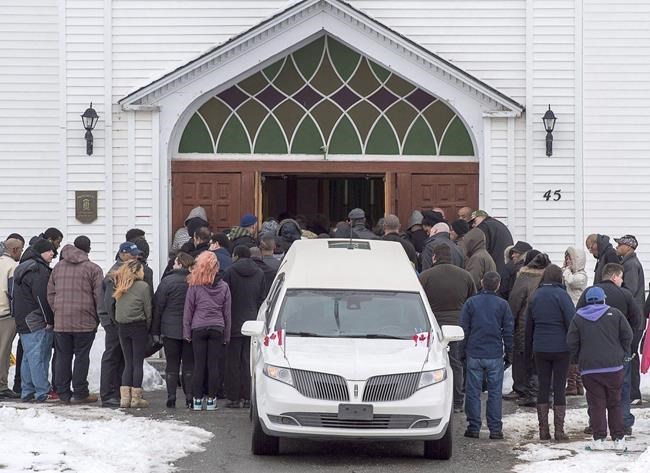PORT HAWKESBURY, N.S. — An inquiry investigating why a former soldier killed his family and himself in 2017 heard Friday from a psychiatrist who said there was an aspect of Lionel Desmond's life he could not figure out.
Anthony Njoku was working at the Operational Stress Injury Clinic in Fredericton in August 2015 when he first met the former corporal, who had been released from the military because of his ongoing struggle with post-traumatic stress disorder.
Njoku testified that Desmond was irritable, distracted, distressed and preoccupied by intrusive thoughts that forced him to relive traumatic experiences he had endured as a combat soldier in Afghanistan in 2007.
"I thought he needed a lot of help," Njoku said, adding that Desmond's PTSD was complex and severe.
The psychiatrist, however, said the former rifleman was actually more worried about his wife, Shanna, whom he suspected of wasting money and plotting against him — thoughts the psychiatrist described as bordering on delusions.
He said he couldn't determine whether Desmond's anger toward his wife was the result of PTSD or the byproduct of a relationship breaking down. "I was never able to distinctly make that call," he said. "It was something I was struggling with."
Part of his confusion stemmed from the fact Desmond's descriptions of his wife were at odds with what the psychiatrist saw during a meeting in January 2016, when Desmond showed up with her and his nine-year-old daughter, Aaliyah.
"It was reassuring," Njoku said of Desmond's wife. "She genuinely cared for him."
He said she was interested in her husband's well-being and wanted to know more about his treatment. "His daughter was there. The interactions seemed entirely appropriate between him and the daughter. It was entirely loving."
At that point in his testimony, Njoku paused and started sobbing. The commissioner leading the fatality inquiry, provincial court Judge Warren Zimmer, called for a 20-minute recess.
The inquiry heard that Desmond and Njoku were supposed to meet every three weeks, but that plan fell apart.
Though he lived in nearby Oromocto, N.B., which is close to Canadian Forces Base Gagetown, Desmond had plans to move back home to Nova Scotia, where he planned to re-establish his relationship with his family. As a result, the former infantryman spent a great deal of time travelling between the two provinces, which interfered with his treatment in New Brunswick.
On Thursday, psychologist Mathieu Murgatroyd said his attempts at getting Desmond to take part in prolonged exposure therapy went nowhere.
As well, Njoku said he was worried Desmond's use of medical marijuana may have exacerbated his PTSD symptoms, particularly when it came to paranoia.
At times, Desmond's mental health seemed to improve, but any progress was often erased within days.
Njoku and Murgatroyd decided that regular talk therapy wasn't going to work for Desmond until his mental state stabilized. They asked him to take part in an intensive in-patient program for veterans at Ste. Anne's Hospital in Montreal.
By May 2016, Desmond was ready to go, but he was in rough shape. He had stopped taking his medications and he worried constantly about the poor state of his finances. He also lost weight because of a meagre diet.
Still, he spent two-and-a-half months at Ste. Anne's. But that was less than half the recommended six-month stay. And in August 2016, he returned to his home in Upper Big Tracadie, N.S.
The inquiry has heard that for the next four months, Desmond received no therapeutic treatment. As Veterans Affairs Canada was making arrangements for him to receive treatment in Nova Scotia, he sought help from the hospital in nearby Antigonish, N.S.
On Jan. 3, 2017, Desmond used a semi-automatic rifle to kill his 31-year-old wife, their 10-year-old daughter and his 52-year-old mother, Brenda, inside the family's rural home in eastern Nova Scotia.
This report by The Canadian Press was first published Feb. 26, 2021.
— By Michael MacDonald in Halifax
The Canadian Press



